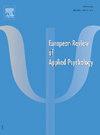“The day the Earth stopped” – How belief in a just world affected emotions and job outcomes during the COVID-19 pandemic: Comparison between Brazil and France
IF 1.4
4区 心理学
Q3 PSYCHOLOGY, APPLIED
European Review of Applied Psychology-Revue Europeenne De Psychologie Appliquee
Pub Date : 2025-04-01
DOI:10.1016/j.erap.2024.101062
引用次数: 0
Abstract
Introduction
While the measures taken to contain COVID-19 have been criticized in many countries, their emotional impact has encouraged people to draw on organizing principles about the world, such as belief in a just world (BJW). Alongside this, reactions to an exceptional and extreme life event also affect labor relations, and have given rise to a crisis that is still evident today.
Objective
Based on the Affective Event Theory (AET), the study aims to test how behavior at work is affected by an extreme life event as a function of the work environment.
Method
449 teleworkers in Brazil and 236 in France participated in the study, considering that these two countries had imposed similar periods of mandatory teleworking while adopting different policies. Empirical models were tested using structural equation modeling, and differences between countries were tested using ANOVA.
Results
Low positive emotions tended to decrease perceived job satisfaction when BJW was high in both countries. This also occurred among French teleworkers when they had high negative emotions. BJW directly affected both performance and job satisfaction in Brazil and only job satisfaction in France.
Conclusion
Results offer support for the AET and confirm that the work environment indirectly influences affective experiences and work outcomes. Despite a limited sample, because the respondents were part of the minority of the working population who could stay at home, the study offers a practical contribution. The difference in support perceived by French and Brazilian teleworkers reinforces the idea that attention to ideals and contextual conditions is essential for maintaining emotional health and job performance.
“地球停止运转的那一天”-在2019冠状病毒病大流行期间,对公正世界的信念如何影响情绪和工作成果:巴西和法国的比较
导论虽然为遏制COVID-19所采取的措施在许多国家受到批评,但其情感影响鼓励人们借鉴有关世界的组织原则,例如对公正世界的信仰。除此之外,对特殊和极端生活事件的反应也会影响劳资关系,并导致今天仍然明显的危机。目的基于情感事件理论(AET),本研究旨在检验极端生活事件作为工作环境的函数对工作行为的影响。方法考虑到巴西和法国这两个国家的强制远程工作时间相似,但采取不同的政策,巴西和法国分别有449名和236名远程工作者参与了研究。实证模型采用结构方程模型进行检验,国家间差异采用方差分析进行检验。结果当工作满意度较高时,慢积极情绪倾向于降低工作满意度。当法国远程工作者的负面情绪很高时,也会出现这种情况。在巴西,BJW直接影响绩效和工作满意度,而在法国仅影响工作满意度。结论工作环境对情感体验和工作结果有间接影响。尽管样本有限,但由于受访者是少数可以呆在家里的工作人口,因此该研究提供了实际贡献。法国和巴西远程工作者在支持度上的差异强化了对理想和环境条件的关注对于保持情绪健康和工作表现至关重要的观点。
本文章由计算机程序翻译,如有差异,请以英文原文为准。
求助全文
约1分钟内获得全文
求助全文
来源期刊

European Review of Applied Psychology-Revue Europeenne De Psychologie Appliquee
PSYCHOLOGY, APPLIED-
CiteScore
2.20
自引率
20.00%
发文量
38
期刊介绍:
The aim of the Revue européenne de Psychologie appliquée / European Review of Applied Psychology is to promote high-quality applications of psychology to all areas of specialization, and to foster exchange among researchers and professionals. Its policy is to attract a wide range of contributions, including empirical research, overviews of target issues, case studies, descriptions of instruments for research and diagnosis, and theoretical work related to applied psychology. In all cases, authors will refer to published and verificable facts, whether established in the study being reported or in earlier publications.
 求助内容:
求助内容: 应助结果提醒方式:
应助结果提醒方式:


